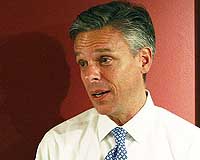| . |  |
. |
Washington (AFP) May 7, 2011 The United States and China approach high-level talks in Washington this week on a more even footing reflecting the Asian giant's rising economic power, but a bumpy road lies ahead. At the annual US-China Strategic and Economic Dialogue meeting, senior officials are expected to discuss the way forward as well as stumbling blocks, like human rights, trade imbalances and China's undervalued currency. The two-day talks that open Monday come amid a round of sparring between the world's largest economies that augurs little chance of a sudden snap into much closer ties. The United States made no tangible progress during an annual human rights dialogue with China in late April in Beijing, in which the US envoy, Assistant Secretary of State Michael Posner, accused China of "serious backsliding" on human rights. China rebuffed the criticisms, reiterating that its handling of dissent was its own business. Kurt Campbell, the assistant secretary of state for East Asia, said last week that the United States would raise human rights concerns at this week's talks "directly, honestly and openly" with visiting Chinese officials. But China set down a red line. Vice Foreign Minister Cui Tiankai saying Beijing was "willing to have an exchange of views with the US and have dialogue with them on the basis of equality and mutual respect". He cautioned: "I think it is advisable for the United States to pay more attention to the development of China in terms of human rights, rather than being preoccupied with individual cases." Human rights groups will be keeping a close eye on how loudly the United States raises its concerns. "The Chinese government takes careful note of which US officials and agencies do and don't talk about human rights, so showing commitment requires across-the-board coordination," warned Sophie Richardson, Asia advocacy director at Human Rights Watch. The third annual dialogue will be led on the US side by Secretary of State Hillary Clinton and Treasury Secretary Timothy Geithner. Their Chinese counterparts are Vice Premier Wang Qishan and State Councilor Dai Bingguo. In a sign of warming defense relations, military representatives will take part in the talks for the first time. The United States said it would press China again to allow its undervalued currency, the yuan, to appreciate, a politically sensitive issue that has long haunted talks. "Next week, we are going to press China to let its exchange rate adjust at a faster pace to correct its still substantial undervaluation," said David Loevinger, a senior Treasury Department official. Treasury chief Geithner acknowledged the yuan had appreciated by more than five percent since Beijing decided in June 2010 to allow it to trade more freely against the dollar. Geithner spoke of "promising shifts in the economic policy in China" but stressed the need to "see durable changes in actual policies on the ground." But on Friday in Beijing, Chinese officials made clear that while they were willing to talk about currency policy, they would not be pushed on the pace of appreciation. "On these issues, to be frank with you, we have different views that make discussions necessary," Vice Finance Minister Zhu Guangyao told reporters, adding that exchange rate policy was China's sovereign right. The talks come as the two economic superpowers grow increasingly interdependent. China is the biggest foreign financier of the yawning US public debt, with bond holdings of $1.154 trillion in February. Douglas Paal, vice president for studies at the Carnegie Endowment for International Peace, said that the United States was achieving its currency goals not due to talks but because of China's inflation. The talks "won't produce breakthrough announcements but the results are moving in that direction, largely because China is afraid of inflation," said Paal, formerly the top US diplomat in Taiwan. Consumer prices in the booming Chinese economy surged 5.4 percent in March from a year ago -- the fastest pace since July 2008 and well above the government's 2011 target of four percent. "We're getting through inflation the revaluation of the renminbi (yuan) and devaluation of the dollar that is improving our export performance into the Chinese market," he said.
Share This Article With Planet Earth
Related Links Learn about the Superpowers of the 21st Century at SpaceWar.com Learn about nuclear weapons doctrine and defense at SpaceWar.com
 US, not China, inspires world: Huntsman
US, not China, inspires world: HuntsmanWashington (AFP) May 7, 2011 Potential Republican White House contender Jon Huntsman on Saturday told Americans worried about Beijing's rise that the United States remains "the envy of the world." "We are still as full of potential as ever," Huntsman, whose term as ambassador to Beijing ended in April, told students graduating from the University of South Carolina. "Our free and open society that can respectfully em ... read more |
|
| The content herein, unless otherwise known to be public domain, are Copyright 1995-2010 - SpaceDaily. AFP and UPI Wire Stories are copyright Agence France-Presse and United Press International. ESA Portal Reports are copyright European Space Agency. All NASA sourced material is public domain. Additional copyrights may apply in whole or part to other bona fide parties. Advertising does not imply endorsement,agreement or approval of any opinions, statements or information provided by SpaceDaily on any Web page published or hosted by SpaceDaily. Privacy Statement |